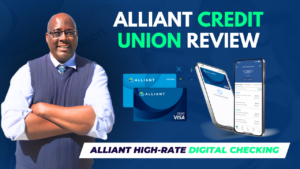Making common Navy Federal mistakes can seriously derail your financial plans and sour your relationship with one of the best credit unions out there.
From my experience, many members and potential members simply aren't aware of certain traps that can lead to closed accounts, denied funding, or even legal headaches.
I want to break down ten critical errors I see people make with Navy Federal Credit Union (NFCU) and share how you can navigate their system the right way.
Getting these points straight is vital if you want to make the most of your membership and dodge costly errors.
Are You Buying or Selling Navy Federal Access Codes? (Mistake #1)
Let me be clear: one of the absolute worst Navy Federal mistakes involves messing with access codes. I strongly warn you – never buy an access code to get in, and if you're a member, never sell yours.
- What Not To Do: Don't buy codes from strangers. Don't sell or give away your member code.
- Why It's a Mistake: I've seen this tied directly to fraud, especially using fake Credit Privacy Numbers (CPNs) instead of real SSNs. NFCU is actively cracking down on this.
- The Consequences: Here’s the scary part: if someone uses your code fraudulently (like with a CPN), Navy Federal might shut down your accounts too, even if you didn't know! The person using the CPN? Their account gets closed, and NFCU might sue them to get their money back. Trust me, NFCU does pursue legal action.
- The Right Way: Your access code is only meant for sponsoring eligible family or people living at your same address. That's it.
Table 1: Access Code Mistakes Summary
| Mistake | Why It's Bad | My Recommendation |
| Buying an Access Code | High fraud risk, leads to account closure. | Qualify legitimately through service, family, or household. |
| Selling Your Access Code | Ties you to fraud, risks your accounts & liability. | Only share directly with eligible household/family members. |
| Using/Facilitating CPN Usage | Blatant fraud, account closure, potential lawsuits. | Always use your valid SSN or ITIN. |
Is Chasing the $80k Flagship Card Your Only Goal? (Mistake #2)
I see a lot of folks fixated on getting that Navy Federal Flagship Rewards card with the massive $80,000 limit. Focusing only on this high limit is often one of the Navy Federal mistakes because it shows a misunderstanding of how they usually grant that kind of credit.
- What Not To Do: Don't make the $80k Flagship limit your be-all, end-all goal without understanding the path there.
- Why It's a Mistake: Often, that huge limit isn't just handed out as new credit. NFCU frequently achieves it through internal "product changes" or consolidating limits from your other NFCU cards onto the Flagship. To get $80k in brand new unsecured funding requires proving you have a very substantial income. Plus, once your total credit with them hits that
75k−75k−80k range, getting more large approvals gets much tougher unless your income is stellar. - My Recommendation: Look at all their cards. Pick the ones that actually benefit how you spend. Don't just chase the biggest number. Build a solid overall relationship first – that’s key.
Are You Misunderstanding the Purpose of Pledge Loans? (Mistake #3)
The Navy Federal Pledge Loan is great for credit building, but I frequently see people making Navy Federal mistakes by misusing it.
- What Not To Do: Don't take out a bunch of Pledge Loans thinking it's a shortcut to getting approved for big personal loans.
- Why It's a Mistake: I need you to understand this: the Pledge Loan primarily helps your internal score with Navy Federal (that hidden 100-450 score). This internal score heavily influences credit card approvals and limits. It has very little direct effect on getting unsecured personal loans.
- My Recommendation: Usually, just one Pledge Loan is enough to start building payment history and boosting that internal score for credit card goals. Don't get multiple thinking it unlocks personal loans – it doesn't work that way.
Table 2: High Limits & Pledge Loan Mistakes Summary
| Mistake | Why It's Bad | My Recommendation |
| Obsessing Over $80k Flagship Limit | Often involves consolidating limits, needs high income for new credit, caps total exposure. | Focus on relationship & cards suiting your needs. |
| Multiple Pledge Loans for Loans | Primarily builds internal score for cards, not personal loans. | Use one pledge loan for internal score/card history building. |
Are You Neglecting Relationship Building (Direct Deposit, Checking, Savings)? (Mistakes #4, #5, #6)
Navy Federal runs on relationships. Ignoring the basics of building that relationship is a huge Navy Federal mistake, especially if your credit isn't perfect.
- Direct Deposit (#4): Not having direct deposit makes you look less stable to them. I've seen members with lower scores (like 580) get approved for big credit lines ($25k+) because they had consistent direct deposits going back 6+ months. It shows commitment.
- Checking Account Type (#5): Just having a checking account isn't the best move. I always advise opening the Flagship Checking account. It signals you're a more serious, engaged member.
- Savings Activity (#6): Don't just open a savings account and leave $5 in it. Regularly putting money in, even just $25 a week, shows you're active and strengthens that relationship, especially in those crucial first few months.
Did You Wait 91 Days Before Applying (If You Have Bad Credit)? (Mistake #7)
Jumping the gun and applying for credit right after joining, particularly with weaker credit, is a classic Navy Federal mistake.
- What Not To Do: If your credit needs work, don't apply for cards the day after you join.
- Why It's a Mistake: Navy Federal likes to watch new members for a bit, especially those with lower scores. Applying too early often leads to an easy denial.
- My Recommendation: Give it at least 91 days – about three months – after becoming a member before you hit that apply button for a credit card if you have challenging credit. Use that time to get direct deposit going and make those small savings deposits to build trust.
Table 3: Relationship Building Mistakes Summary
| Mistake | Why It's Bad | My Recommendation |
| No Direct Deposit | Weakens relationship, misses showing stability. | Set up consistent direct deposit (aim for 6+ months). |
| Basic Checking (vs. Flagship) | Less effective for relationship building signals. | Open the Flagship Checking account. |
| Inactive Savings Account | Doesn't show active engagement with NFCU. | Regularly deposit small amounts ($25/week) into savings. |
| Applying Too Soon (Bad Credit) | Increases denial risk before relationship is proven. | Wait at least 91 days post-membership before applying. |
Do You Understand Navy Federal's Business Credit Nuances? (Mistakes #8, #9)
For my entrepreneurs out there, making these Navy Federal mistakes with business accounts is common.
- Score Requirements (#8): NFCU looks at two things for business credit cards: your personal FICO Score 9 (they usually pull Experian for business) and that internal relationship score I mentioned. You need both to be decent.
- NAICS Code Importance (#8): This is a big one. If you use a high-risk NAICS code (your industry code) when opening the business account, they will deny you. You must use a low-risk code they find acceptable. (If you need help figuring this out, I can assist).
- Reporting Limitations (#9): Listen up: Navy Federal business accounts do not typically report your payment history to the main business credit bureaus (D&B, Experian Business, Equifax Business, SBFE). So, using only NFCU for your business won't build the business credit profile you need to get funding from other banks.
- My Recommendation: Know they check both scores, use the right NAICS code, and use other banks known to report (like Chase, Citi, Capital One, Amex, Truist, PNC) to actually build your reportable business credit history.
Are You Settling Charged-Off Accounts Instead of Communicating? (Mistake #10)
How you handle past debt with NFCU is critical. Making this Navy Federal mistake can lock you out for years.
- What Not To Do: If you unfortunately had an NFCU account charge off, don't just settle it for pennies on the dollar if you ever want a good relationship with them again.
- Why It's a Mistake: When you settle for less than what you owed, Navy Federal often puts you on an internal blacklist – sometimes for up to 10 years! This means no new credit products from them during that time.
- My Recommendation: If you see financial trouble coming before the account charges off, call them. Be upfront. They often have programs to help, maybe pausing payments or setting up a smaller payment plan.
- This is much better than getting blacklisted. If you're already on that list, you might need to look at alternatives like NASA Federal Credit Union (they use VantageScore 4.0 and are easier to join) while you wait out the 10 years.
Are You Overlooking CDs and Money Market Accounts? (Bonus Tip)
One last thing I see people miss – don't ignore their other deposit accounts.
- What Not To Do: Don't think Certificates of Deposit (CDs) or Money Market accounts don't matter for your credit goals.
- Why It Matters: Opening these, even with just the minimum needed (maybe $250 or $500), shows you're planning long-term with them. It adds another layer to that relationship and subtly helps your internal standing.
Table 4: Business Credit, Settlements & Deposit Account Mistakes Summary
| Mistake | Why It's Bad | My Recommendation |
| Ignoring Internal Score for Business | Both personal & internal scores matter for bus. approvals. | Actively work on improving your internal score. |
| Using High-Risk NAICS Code | Will cause business account denial. | Research and use an acceptable low-risk NAICS code. |
| Relying on NFCU for Bus. Credit Building | NFCU activity doesn't build your external bus. credit reports. | Use lenders that report to D&B, Experian Biz, etc. |
| Settling Charged-Off NFCU Debt | Results in a long (up to 10-year) internal blacklist. | Communicate hardship before charge-off; try to pay in full. |
| Ignoring CD/Money Market Accounts | Missed opportunity to signal long-term relationship. | Consider opening one to strengthen your internal profile. |
The Bottom Line on Avoiding Navy Federal Mistakes
Getting the most out of Navy Federal isn't just about your FICO score. It's about understanding their relationship-first culture.
By steering clear of these ten critical Navy Federal mistakes I've outlined – from code sharing and chasing huge limits blindly, to neglecting basic relationship steps and botching business account setup or past debt resolution – you drastically improve your odds of getting approved, receiving better limits, and forging a really valuable, long-term financial partnership with NFCU.
If you feel stuck or need specific advice tailored to your situation with Navy Federal or business funding, schedule a one-on-one consultation. Let's get you on the right track.










